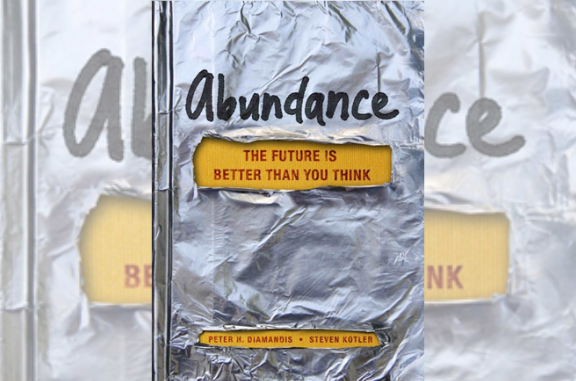

“This brilliant must-read book provides the key to the coming era of abundance replacing eons of scarcity.Abundance is a powerful antidote to today’s malaise and pessimism.” – Ray Kurzweil
“Abundance provides proof that the proper combination of technology, people and capital can meet any challenge.” – Sir Richard Branson
Just when we think we thought we’d reached the dregs of how bad things can possible get for the human condition, along comes a book that slaps seven shades of sense into all the doomsdayers, naysayers, and ecclesiastic soothsayers. I’ll say it and get it over with: I read this book and immediately went out and bought a dozen copies for all the people I respect and admire. This is a book that everyone should read. If ever there was an exhilarating, optimistic book about how progress in artificial intelligence, robotics, infinite computing, ubiquitous broadband networks, digital manufacturing, nanomaterials, synthetic biology, and many other exponentially growing technologies will enable us to make greater gains in the next two decades than we have in the previous two hundred years, then this book is it! It has a cornucopia of interesting facts, a plethora of positive stories, and a luxurious bounty of information about paradigm-changing technologies.
Diamandis’ book gets off to a cracking start with the story of Aluminium: from antiquity right up to the mid-19thcentury, Aluminium was the one of most expensive metals—not because it was rare (it’s the third most abundant element in the Earth’s crust) but because we didn’t know how to extract it from it’s ore, bauxite. However, once we developed the technology of electrolysis, we had access to incredible amounts of aluminium at—quite literally—throwaway prices.
The point Diamandis makes with this example is that scarcity is contextual and technology is a resource-liberating mechanism. Diamandis points out that “70% of the planet is covered in water. 97.5% of that is salt water; 2% is ice and we fight over 0.5% of the water on this planet.” He asks us to consider what would happen if we discovered the technology to desalinate salt water just as easily as we use electrolysis to extract Aluminium from Bauxite. What impact would this have on the human condition?
He echoes the sentiments of David Deutsch, who, in his book The Beginning of Infinity, says that conservation and recycling are short terms solutions, and that the long term solution is to invent our way out of problems. Our response to the threat of scarcity is not to slice the pie thinner, he says, but rather to figure out how to make more pies.
Who will help us usher in this new era of abundance?—Diamandis identifies four sources: Technology, Maverick Innovators, Techno-philanthropists, and what he calls ‘the Rising Billion’ – the poorest of the poor who are now coming online, joining the global discourse, and transforming themselves into an emerging market force. He points out, that the poor in America today have access to luxuries like electricity, flushing toilets, and mobile phones that a hundred years ago billionaires like Ford and Vanderbilt didn’t have.
Diamandis blows the reader away with some astonishing statistics: since the beginning of time until 2003, we’ve created five exabytes of digital information. (An exabyte is one billion gigabytes). By 2010 we were generating five exabytes of information every two days. By the end of 2013, we’ll be producing five exabytes of information every ten minutes. In such a scenario, people find it difficult to grasp the implications of the concept of abundance. Our brains evolved in a local linear environment. However, we are now living in a global exponential world. Exponential growth in technologies would have tremendous implications on betterment of the human condition: 3-D printing, speech recognition, supercomputing, nanobots… will radically change our world.
The book is packed with optimistic ideas that offer the jaded reader a radically new perspective and persuasive reasons to be sanguine about the future: we’re living longer, wealthier, richer, safer lives than at any time in the history of our species.
What I particularly like about this book is the can-do-will-do attitude that runs through it and the constant emphasis on collaboration. The tools of the digital and cyber world have given individuals the incredible cooperative capacities and the ability to understand and affect global issues as never before. From collaboration on the creation of the Linux code to the success of Wikipedia, he offers numerous examples of disparate people coming together to make a positive impact.
Yes, there will be cynics who will whine about the dark side of technology; yes there will be pessimists who carp about the corruption in the world; and detractors who will complain about the scale of our problems. But Diamandis, points out that to change the world one must have passion and purpose in order to convince the world of anything—which is of course the first step to changing it.
I urge everyone to watch his TED talk: Abundance is Our Future. It is probably one of the best talks on TED. (Peter Diamandis is the chairman and CEO of the X Prize Foundation, the co-founder of Singularity University, and co-founder of International Space University. He has a degree in molecular biology and aerospace engineering from MIT, and an M.D. from Harvard Medical School.)